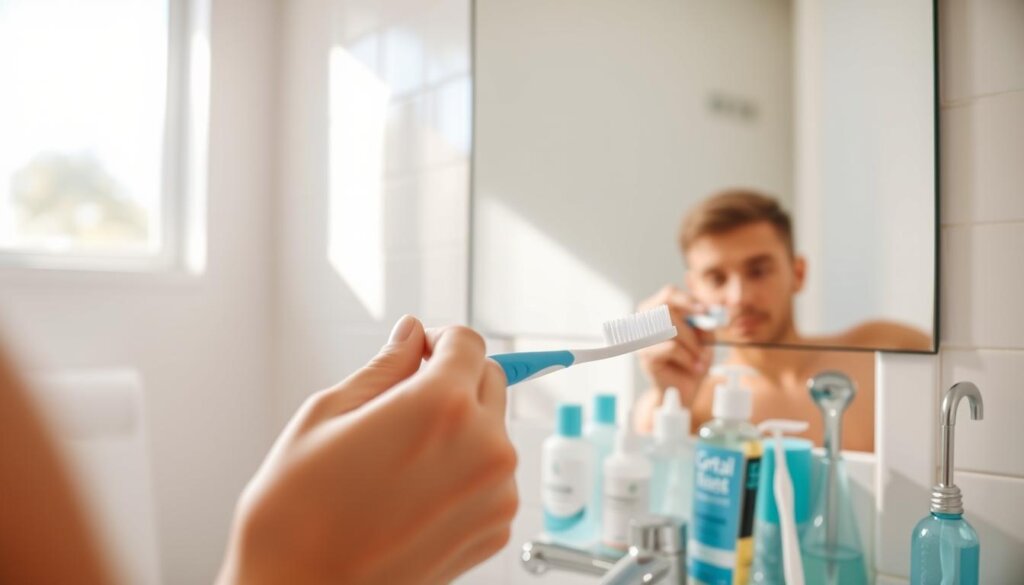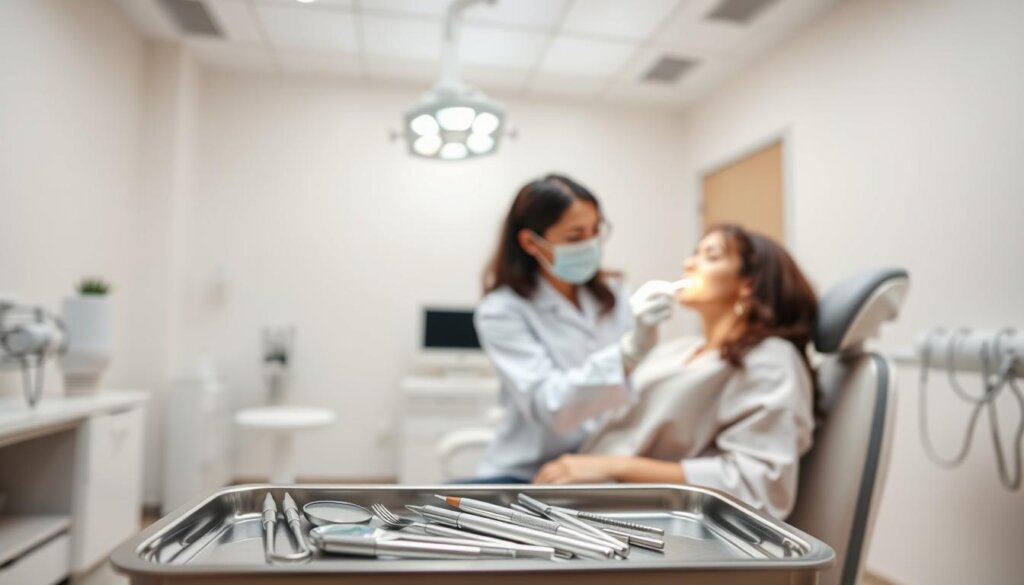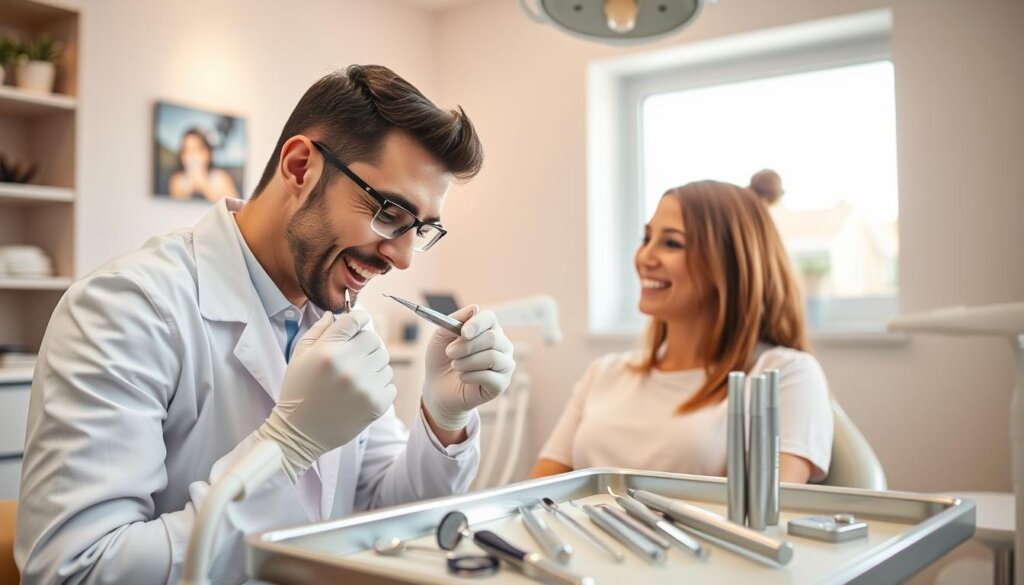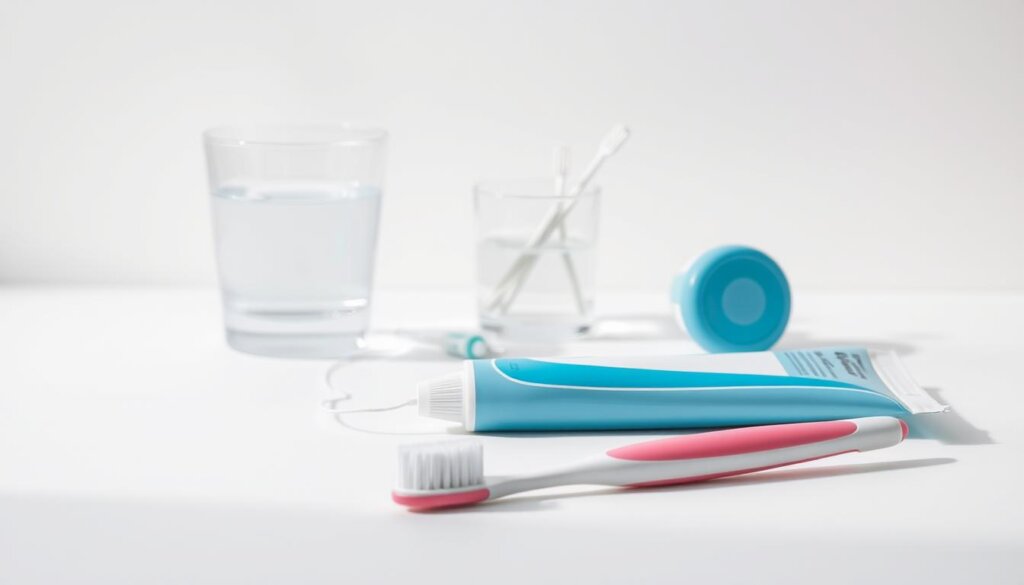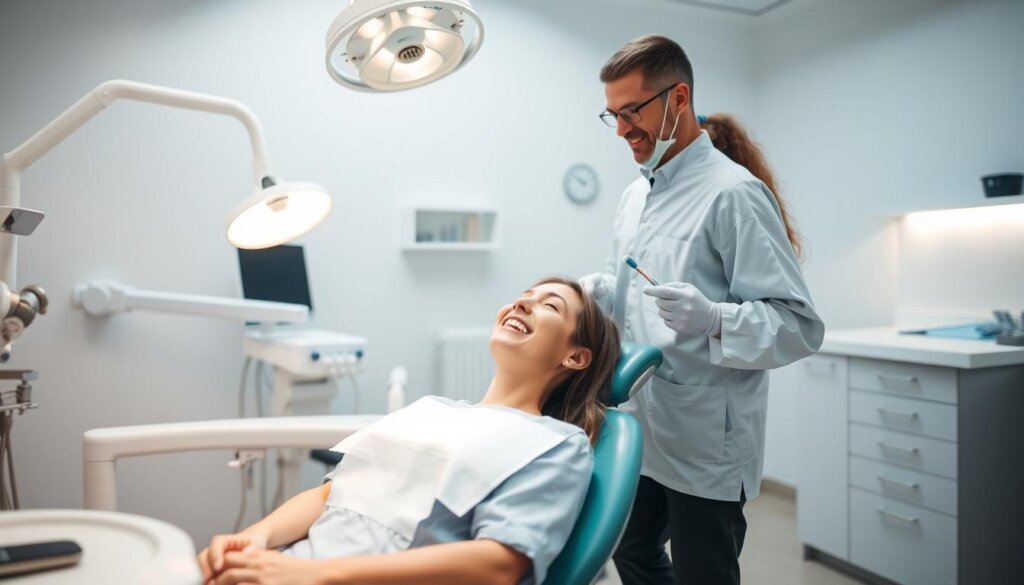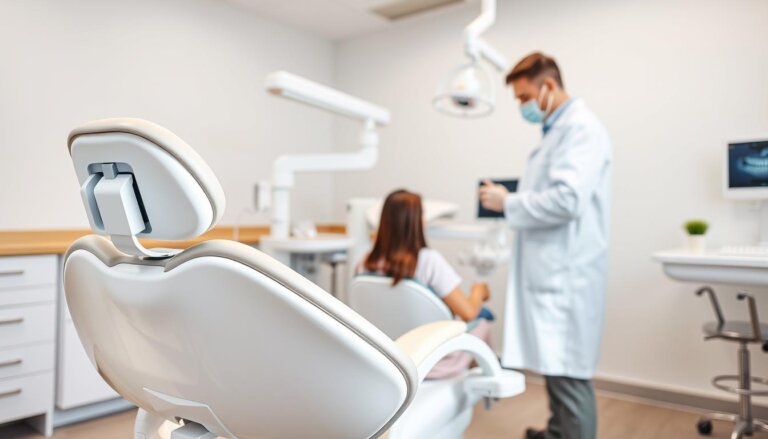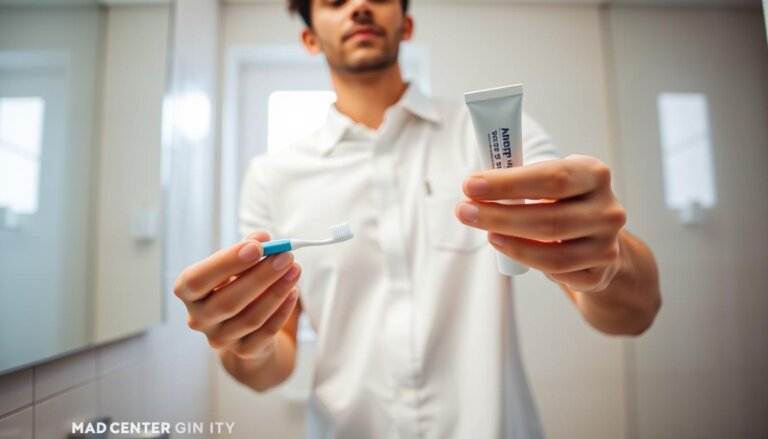Should I Brush My Teeth Before a Dental Appointment?
Studies show around 25% of people don’t brush their teeth before seeing a dentist. This reveals a big gap in how people prepare for dental visits. Brushing before your appointment helps keep your mouth clean and makes your check-up more effective.
Proper dental care before seeing the dentist allows for a better examination. It removes debris and bacteria. This not only helps your oral health but also makes it easier for the dentist to work. It’s key for getting the most out of your dental visit.
Key Takeaways
- Brushing teeth prior to a dental appointment contributes significantly to one’s oral hygiene.
- Proactive dental care helps in a richer assessment and a more effective dental visit.
- Good dental visit preparation reflects positively on treatment outcomes.
- Being part of the 75% who practice hygiene before an appointment can enhance the dentist’s ability to diagnose and treat.
- Dental practitioners value patients who take active steps in maintaining their oral health.
Importance of Oral Hygiene Before an Appointment
Before any dental visit, it’s key to have a good tooth care routine. Good oral health practices help keep your teeth healthy for a long time. They also make your dental appointment go smoothly. By taking care of your teeth regularly, you can get rid of food bits. These bits could turn into plaque, leading to issues like cavities and gum disease if not cleaned.
The Role of Brushing in Dental Care
Brushing your teeth well and often is at the heart of keeping your mouth healthy. It gets rid of bacteria that cause plaque. Good tooth brushing tips tell us how to do it right. It’s important to brush every part of your teeth with fluoride toothpaste and a soft toothbrush. This helps fight off dental problems effectively.
Benefits of Fresh Breath during the Visit
Having fresh breath is more than just being polite; it’s crucial for your dental check-up. Fresh breath means your dentist can check your oral health better. There are no smells from food or drinks getting in the way. Plus, a clean mouth lets the dentist do a faster, more accurate check-up. This is good for both you and your dentist.
So, sticking to a strict tooth care routine and using helpful tooth brushing tips are key for a dental visit. They keep your smile looking good and your teeth and gums healthy. This sets you up for great dental health and a nice experience at the dentist.
What to Expect During a Dental Checkup
Going to regular dental checkups is key for good oral health. At these visits, you’re checked in various ways to prevent problems and keep your mouth healthy. Knowing what happens there can ease worries and get you ready for your visit.
Checkups are in-depth so dentists can closely examine your mouth and do necessary upkeep. They clean your teeth, treat them with fluoride, and check for early signs of trouble. Stopping problems before they get worse is key to good dental health.
Common Procedures Performed
During a typical checkup, dentists do a few important things to help keep your mouth clean and spot issues:
- Dental Cleaning: This step gets rid of plaque and tartar that brushing at home can’t. It helps stop gum disease and cavities.
- Fluoride Treatment: After cleaning, your teeth might get a fluoride treatment. This makes the outer layer of your teeth stronger and fights decay.
- X-rays: Depending on your dental past and how long it’s been since your last visit, you might get x-rays. They help find problems that can’t be seen on the surface.
Evaluation of Oral Health
The dentist will check your oral health carefully to find any warning signs of trouble:
- Examination of Gum Health: This checks for signs of gum disease by looking at inflammation and measuring the depth of the spaces between your gums and teeth.
- Checking for Tooth Decay: Each tooth is looked at for decay or cavities, which can lead to bigger problems if ignored.
- Oral Cancer Screening: The dentist will check for signs of oral cancer with a visual and physical exam, highlighting why regular visits are crucial.
Understanding these processes can make your dental visits less stressful and show how important it is to listen to your dentist’s advice. Regular checkups keep your teeth and gums healthy and help avoid more serious issues later on.
Brushing Techniques to Consider
Learning the best way to brush your teeth is key for top oral health. This means more than just choosing the right tools. It’s also about how you use them to keep your mouth clean and your teeth healthy.
Picking the right toothbrush and toothpaste is the first step. Experts say to use toothbrushes with soft bristles. Soft bristles are easy on your gums but tough on plaque and leftover food. They work well with fluoride toothpaste, which strengthens the enamel and fights cavities, boosting your dental health.
But there’s more to brushing than just moving the brush back and forth. Here’s the best way to brush:
- Start with your brush at a 45-degree angle to your gums.
- Use soft, circular motions to clean every part of each tooth.
- Make sure to brush the outer, inner, and top surfaces of the teeth.
- Brush gently along the gum line and focus on back teeth and places with fillings or crowns.
Using these techniques every day will make a big difference in your oral health. It shows you’re taking charge of your dental care. This means not just better teeth and gums but also better health overall. It highlights how important oral health is to your entire body’s wellness.
Potential Risks of Not Brushing Before an Appointment
Skipping the step of brushing before a dentist visit can lead to oral health issues. Not brushing can cause a lot of plaque to form, which is behind many dental problems.
Plaque Buildup and Its Impact
Plaque is a sticky layer on your teeth made of bacteria and their waste. It sticks strongly to teeth and gums. Without proper cleaning, plaque turns into tartar, which is harder to remove without a dentist’s help.
The build-up of plaque and tartar can ruin your smile. It can also cause tooth decay and gum disease. This might need serious dental work later.
Increased Chances of Bad Breath
Not brushing before your appointment can also make your breath smell worse. The bacteria in plaque produce foul odors. This is not pleasant for you or your dentist during cleaning.
Brushing well before a dental visit is key to avoiding plaque and bad breath. Dentists also say good oral hygiene is important for a nice smile and dental health over time.
How Dentists View Patient Hygiene
Dentists think it’s very important for patients to keep their mouths clean. This helps treatments work better and faster. It also shows that patients care about their health.
Good dental care starts at home. Dentists hope patients will clean their teeth well before coming in. This makes check-ups and treatments go smoother and faster.
- Brushing and flossing remove bits of food and plaque, making it easier to find and treat problems like cavities early.
- Having clean teeth lowers the chance of getting infections or having problems during dental work.
- People who take care of their teeth usually don’t need to visit the dentist as often. Their good habits help keep their mouths healthy.
Relationship Between Hygiene and Treatment Outcomes
Dentists see a clear link between how well patients brush and floss and how well treatments work. If you take care of your teeth, you’re less likely to have problems and will heal faster.
Dentists’ Expectations from Patients
Dentists need patients to take good care of their teeth, no matter what treatment they’re getting. Brushing and flossing can make a huge difference. Dentists really value it when patients take their dental health seriously.
Timing: When to Brush Before Your Appointment
Knowing the best time to brush before a dental visit helps prep better and cleans your mouth well. It’s key to brush at the right time for healthy teeth and smooth checkups.
The advice to brush about 30 minutes before seeing the dentist comes from experts. This gives the fluoride time to work on your teeth. Also, it helps you avoid feeling rushed, making for a calm visit.
| Activity | Time Before Appointment | Purpose |
|---|---|---|
| Brushing Teeth | 30 Minutes | Maximize fluoride interaction with enamel |
| Reviewing Tooth Brushing Tips | 45 Minutes | Ensure thorough cleaning techniques |
| Final Oral Hygiene Check | 10 Minutes | Ensure no food particles remain |
Brushing at the right time is more than good hygiene. It also backs up what your dentist does. Follow these timing tips to care for your teeth and make dental visits go smoothly.
Other Oral Hygiene Practices to Consider
To improve your dental care routine, look at all oral health practices. Besides brushing, other actions can enhance your oral hygiene. These are important before seeing the dentist.
Flossing: Ever wondered if you should floss before a dental visit? Yes, you definitely should. Flossing gets rid of plaque and food stuck between your teeth where a brush can’t reach. It’s very helpful before checkups, making it easier for the dentist to do a complete exam and care.
| Tool | Benefit | Recommended Use Time |
|---|---|---|
| Dental Floss | Removes hidden plaque and food particles | At least once daily, preferably before your dental visit |
| Mouthwash | Reduces oral bacteria, refreshes breath | As per label direction; avoid immediate use before dental exams |
Mouthwash: There’s a debate about its use. Mouthwash is a good addition but shouldn’t replace brushing or flossing. It can lower bacteria and make your breath fresh. Choose a mouthwash without dyes or strong flavors before exams to avoid hiding problems.
Adding steps like flossing and using mouthwash wisely improves your dental visits. These habits are key for great dental hygiene and your overall health.
Special Cases: Dental Procedures and Hygiene
Getting ready for a dental visit means knowing how to prepare. Depending on if it’s a regular checkup or a dental cleaning, you’ll need a different approach. We will look into the best ways to prepare for these visits. Also, we’ll talk about the special needs of those with braces.
Preparing for Cleanings vs. Checkups
Before a dental cleaning, it’s vital to brush and floss well. This helps reduce plaque and makes the professional cleaning more effective. On the other hand, preparing for a checkup focuses on showing the dentist your overall oral health. Here, keeping your teeth and gums clean is important but not as intensive.
Considerations for Orthodontic Patients
Those with braces need extra care before their dental visits. It’s important to clean around your braces to avoid problems during the check-up. Good cleaning helps maintain your oral health and makes your visit easier.
The Influence of Diet on Oral Health
Our food choices affect more than our body; they also impact our teeth and gums. A thoughtful diet is crucial for keeping your mouth healthy. Before your next dentist visit, think about what you eat to help your oral health.
Foods to Avoid Before Your Appointment
Avoiding certain foods before seeing your dentist can help. It prevents stains and bad breath, making the check-up smoother. Stay away from foods like:
- Garlic and onions due to their strong odors which linger in the mouth.
- Fish and certain dairy products, which may also contribute to unpleasant breath.
- Coffee, tea, and red wine, known for their role in staining teeth.
Foods to Embrace for Healthier Teeth
Adding certain foods to your diet can make your teeth stronger and your mouth cleaner. These good choices include:
- Crunchy fruits and vegetables, such as apples and carrots, which can help clean teeth naturally.
- Dairy products like cheese and yogurt, which offer calcium to fortify teeth.
- Water, as staying hydrated is crucial for maintaining optimal saliva production and washing away food particles.
By choosing the right foods, you help your dental health last longer. This leads to better check-ups at the dentist.
| Dietary Choices and Their Impact on Oral Health | |
|---|---|
| Foods to Avoid | Foods to Embrace |
| Garlic and onions | Crunchy fruits and vegetables |
| Fish and dairy products | Dairy products (cheese, yogurt) |
| Coffee, tea, and red wine | Water |
Addressing Common Concerns
When preparing for a dental visit, it’s common to worry about not brushing or just using mouthwash. It’s key to tackle these issues with expert advice to keep your oral hygiene top-notch.
If you forget to brush, don’t stress. A quick fix is to rinse your mouth with water to clear out bits and lessen smells. But remember, this isn’t as good as brushing. Good mouth care is about more than fixing slip-ups. It’s about sticking to a daily routine.
About mouthwash, though it can freshen breath and cut down on germs, it can’t scrub off plaque like brushing and flossing. Adding mouthwash to your oral care is smart, but don’t use it by itself.
| Action | Effectiveness for Oral Hygiene | Recommended Use |
|---|---|---|
| Brushing | Essential for removing plaque and food particles | At least twice a day |
| Rinsing with water | Mildly useful for cleansing and freshening | Use as needed, especially if brushing is forgotten |
| Using mouthwash | Good for reducing bacteria and freshening breath | Not a substitute for brushing/flossing |
Getting ready for a dental check-up? Make sure you brush, floss, and maybe use mouthwash regularly. This approach makes your dental visit smoother, allowing for an easier check-up and any treatments needed.
Tips for a Successful Dental Visit
For a better dental visit, good dental visit preparation is key. It makes your experience better and helps you get the most from your time with your dentist. It’s important to know what dentists suggest to really benefit from your visit.
Start by thinking of questions to ask during your visit. These could be about your treatment or advice for aftercare. This shows you’re taking charge of your dental health.
- Ask about the procedure’s steps and what happens at each phase.
- Inquire about any possible discomfort and how it can be eased.
- Discuss aftercare to make sure you heal well and stay healthy.
Being mentally prepared is also key. Arrive about 15 minutes early to calm down and avoid feeling rushed. This dental visit preparation lets you get comfy and eases stress.
- Taking your dental records helps your dentist tailor the visit for you.
- Talk openly about any fears you have; dentists know how to help.
Planning well and talking openly with your dentist can change how your visits go. Following dentist recommendations builds a team effort in taking care of your teeth. Good preparation helps now and keeps your teeth healthy in the long run.
Understanding Your Dentist’s Perspective
Dental care is a team effort between the dentist and patient. Optimal results come from working together. Dentists bring their knowledge and commitment to help improve your overall health. They see dental care as more than just a checkup. They view it as a chance to boost your overall health. The sign of good oral health practices is seen when patients show up with clean teeth and a fresh breath. This sets a good start for the visit.
Dentist recommendations are based on science and experience. They aim to stop dental diseases and offer the best treatments. When patients follow their advice on oral health, it lowers the chance of problems. It also makes diagnosing easier, leading to better care. Plus, good oral habits show that a patient cares about their overall health, not just their mouth.
Following a dentist’s advice shows you’re committed to your oral and overall health.
-
- Why They Appreciate Good Hygiene
A clean mouth isn’t just about fresh breath. It helps a lot in examining your teeth. This makes it easier to spot and address issues quickly and accurately. Such cleanliness improves treatment outcomes and can help avoid future dental problems.
-
- The Patient-Dentist Relationship
This bond is crucial for effective dental care. It’s based on trust and open communication, growing stronger with each visit. By listening to professional advice, both you and your dentist share the goal of keeping your mouth healthy. This teamwork leads to the best care.
Dentists value when patients actively care for their oral hygiene. It shows a team approach to health, with both you and your dentist aiming for the best results. This cooperation not only makes dental visits better but also helps keep your teeth healthy for longer.
Final Thoughts on Dental Hygiene Before Visits
Taking care of your teeth is a big commitment. It includes daily habits and getting ready for dental checkups. We’ve learned how important it is to come to your appointments with clean teeth. This shows respect for your dentist and makes your visit more effective. Using the right toothbrush, flossing well, avoiding some foods, and eating a tooth-friendly diet are key steps.
Summary of Best Practices
Seeing your dentist regularly is crucial for preventing dental problems. Being well-prepared for these visits shows you care about your health. Brushing and flossing before going can help your dentist find any issues more easily. Also, eating right helps keep your teeth healthy between visits. Good prep makes dental cleanings quicker and easier.
Importance of Regular Dental Checkups
Regular dental checkups are the foundation of oral health care. They are essential for stopping problems before they start. Early detection helps avoid bigger, more expensive treatments later. In the field of regenerative medicine, preventing disease is just as important as treating it. By preparing properly for your dental visits, you show that you value your health. This allows dentists to provide the best care, helping us all live healthier lives.

